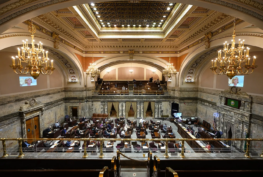First the good news, the state Department of Ecology recently awarded $227 million in grants to local governments for high-priority water quality improvement projects.
One of my district’s small towns, Normandy Park, received about $1.4 million for two important projects to help restore Walker Creek and protect Normandy Creek, and they are thrilled to have been awarded those grants from the Storm water Financial Assistance Program.
But our state Department of Ecology’s budget has been reduced significantly by the steep decline in revenue from the Model Toxics Control Act (MTCA). MTCA revenue is pegged to the price of a barrel of oil and now oil prices are about half what they used to be.
The plight of the Department has been badly exacerbated because general fund dollars to administer this critical state agency has essentially been replaced with MTCA dollars. This MTCA “sweep” began during the “Great Recession” in 2010 when state revenues fell off a cliff and the budget had to be slashed by 30%.
But six years later, the practice is no longer necessary or sustainable. With the decline in MTCA revenues, we are now forcing Ecology to take huge cuts in water quality and toxic cleanup projects that used to be funded by MTCA revenue. Since 2012, when the Republicans took over the Senate budget process, a total of $371 million in MTCA dollars have been swept out of projects and into the state general fund.
And with the current demands for full funding of basic education under the Supreme Court’s “McCleary” ruling, the cutbacks to local government will likely continue. So here’s what’s actually going on under the Republican Senate budget approach. In order to avoid tax increases, the budgeteers approach is to sweep money out of important programs that have had stable sources of revenue as a way to backfill the budget deficits and avoid any tax or fee fights. In Biblical terms, one could say they are “robbing Peter to pay Paul.”
Many of these sweeps have hit local communities especially hard.
For example, the Public Works Account was virtually eliminated by the 2016 supplemental budget, and only won a reprieve with an important gubernatorial veto of the $154 million cut to the fund.
But since 2012, the Public Works Account has been swept of $746 million, with that money swept into the state’s general fund for day to day operations.
The Public Works Account is a successful 30 year revolving fund that has never had a default and has helped hundreds of local governments build basic infrastructure. But the revenues that keep the fund growing, from portions of the Public Utility Tax (PUT) and the Real Estate Excise Tax (REET), were also diverted into the general fund for the operating budget.
The Senate Republicans proposed budget also eliminated the fire insurance premium distributions to local governments, and originally included elimination of funding for the Municipal Research Service, a helpful resource for small towns and communities that don’t have the staff to research complex questions.
Fortunately, in the end amendments and gubernatorial vetoes stalled these cuts, but no one should be surprised to see them back again next year if the political landscape doesn’t change.
Yet another example is the liquor tax. When Washington voters passed the liquor privatization initiative in 2011, a major selling point was that liquor revenues would flow back to local governments for such things as local police services.
Since 2012, the Republican led budget writers have diverted $151 million in liquor tax revenues into the state operating budget and out of local budgets.
Unless we face revenue reality, local towns and cities across the state will have to find new ways, that don’t count on state support, to make ends meet for everything from public works, public safety and environmental clean ups without counting on state revenue support.
Although the “McCleary” Supreme Court decision on basic education funding compels us to fully fund education, I think we must find solutions to this crisis that will not put the citizens in our local communities at risk with failing water and sewer systems, inadequate police services and unacceptable environmental harm.
It should start with an honest conversation about revenue realities. If the state budget is going to suck up every penny, with little to no distribution to our local communities, then we need those small town mayors and city council members prepared to cut their budgets even more for police, fire, water, sewer, parks and recreation.
Or we could, and in my view should, consider collaborating on new ways to reach our shared goals of full funding for basic education and fair funding for our local cities and towns that help make our communities great places for our citizens to live and work. We’re all in this together!
-K2





